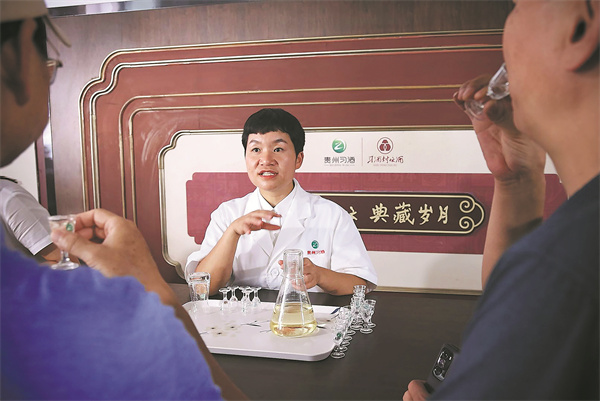Liquor taster embodies spirit of her craft


He Kaiping, who has dedicated years to tasting baijiu, is a delegate from Guizhou to the 20th National Congress of the Communist Party of China, report Chen Meiling and Yang Jun in Guiyang.
Early in the morning, He Kaiping and her colleagues sit in a room, each facing several glasses of white liquor, or baijiu, for them to observe, smell and taste, before writing comments on a score sheet.
For He, 38, deputy director of the blending and storage center of Guizhou-based liquor producer Xijiu, it's an essential procedure to guarantee good quality before the products are sold to customers.
"Each sample needs at least five tasters to evaluate," she says. "The process includes both sensory judgment and physical and chemical analysis. After it meets all standards, we can call it qualified baijiu."
During the peak time of production, from February to September, she tasted more than 100 glasses of baijiu a day until her tongue became numb and her head dizzy.
However, before taking the job, the nationally certificated top-level liquor taster never drank alcohol.
In 2008, He was recruited as a laboratory technician by the company after getting a master's degree in biotechnology. One day, she met with some white liquor tasters and was impressed by the elegance in their posture. She then spent three years teaching herself about liquor tasting, sometimes until late into the night after putting her newborn child to sleep. In 2011, she was transferred to the new post as a taster.
In her first year, she would get upset because her results were often totally different from others. She also found it difficult to connect professional terms with abstract fragrance, or to describe her feelings precisely. Later, she learned to link the smell of baijiu with that of food or plants in daily life.
"Besides a keen sense of taste and smell, a good taster also needs extensive practice and experience to be able to quickly tell the subtle differences in baijiu and keep the memory of the taste firmly in mind, so as to ensure the product's consistency," she says.




































